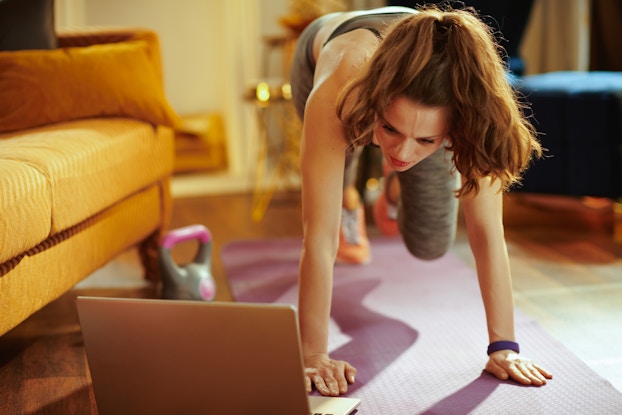
As the coronavirus crisis continues to reshape the business landscape around the U.S., some companies have had to close their doors entirely while others have adapted their business models to meet new expectations. However, some businesses — especially those that are tied to in-person instruction — have reimagined how to deliver their core services by moving to a digital-only model.
Here are 10 types of in-person businesses that have successfully made the jump to virtual.
Babysitting
During the pandemic, many parents have continued to work while also needing to watch their kids and help them with online learning. This means much more time together than normal. One way to help parents and kids take a break from each other is by booking a virtual babysitter, where someone hops on a video call with children to engage and entertain them.


Services such as Sittercity and UrbanSitter now offer sitters at a lower rate than an in-person babysitter, often at 30-minute and hour-long intervals while parents are working. “Kids are missing all the people and activities in their lives,” Elizabeth Harz, CEO of Sittercity, told the New York Times. “Although they are loving all the time with Mom and Dad, the chance to see another face and be entertained is really welcome.”
Cooking classes
While attending in-person cooking classes has been a long-standing activity for those wanting to beef up their culinary skills, those activities can’t be attended any longer. In its place, personal cooking classes have gone virtual. For example, New York-based Haven’s Kitchen hosts regular virtual classes where people can learn how to make better breakfast dishes, steak, fried chicken, fruit pastries and more. All classes are capped at 20 computers to make sure students can ask questions to the chefs and get immediate feedback.
Craft activities
One popular family activity before the pandemic was taking classes focused on crafts. Parents and kids could work together on paper-mache, painting, pottery, and tie-dye clothing projects in arts and crafts studios. Now those same studios are selling craft kits and providing digital instruction. For example, Arizona-based Burst of Butterflies, a pottery and painting studio, has begun selling kits for pottery, canvases, and parties that can be picked up curbside.
Doctor appointments
With many people not comfortable stepping foot in a doctor’s office during the pandemic, telehealth has seen a steep uptick of interest. Many in-person doctor appointments have shifted online with doctors conversing one-on-one with patients over video chat. Dr. Rachael Harris Sprunger, who specializes in pain management at Indiana’s South Bend Clinic, told ABC 57 that the virtual-visit model has provided multiple benefits to patients.
As schools across the U.S. closed during coronavirus, many students have moved to virtual learning.
Personal shopping and stylists
Shopping for clothes, jewelry, and accessories in person will return after the pandemic ends. In the meantime, many stores have begun offering the ability to perform video calls with staff in order to help with shopping and styling. For example, Chloe Dao Boutique — owned and operated by a Project Runway winner — offers styling through FaceTime, texting and calling, and customers can pick up items curbside.
Personal training
With the coronavirus closing many gyms across the country, personal trainers who taught individual and group fitness classes have taken a serious financial hit. Some trainers, however, have been able to make the shift to online classes. For example, Tina Cabrera, a trainer at Brooklyn’s Hit Factory gym, has been offering popular Zoom-based fitness classes. Cabrera calls the class sessions Quarantina, and she told NBC New York her business has actually been better online versus in person.
Speed dating
While speed dating might not be a huge business, it was still thriving in cities around the country until the pandemic hit. Now, speed dating operations have moved online in a bid to help the many single people out there connect with potential matches. For example, Speed San Antonio Dating has launched its own video chat speed dating events for people ages 25 to 39. After singles check into a virtual lobby, they are then paired up in private rooms for eight-minute dates.
Tutoring
As schools across the U.S. closed during coronavirus, many students have moved to virtual learning. However, with this immense shift to online education, some students have struggled and virtual tutors that can provide one-on-one attention have been in high demand. For example, New York’s EBL Coaching has moved from in-person tutoring to instruction over video chat. The tutors from EBL use services such as Zoom and Skype to share screens and work closely with students on various subjects.
Wine tastings
During traditional wine tastings, groups sit down with an expert to taste samples and learn about various bottles of wine. During the pandemic, this idea has been adapted to home environments, with customers buying bottles of wine and pouring samples themselves while getting instruction and conversation over video chat. For example, acclaimed Napa Valley winemaker Matthiasson offers the ability to buy a “tasting pack” of six wines, and then customers can receive a private tasting and virtual tour of the vineyard over Zoom.
Yoga studios
For years, yoga and wellness classes have mostly been an in-person affair. But COVID-19 has made yoga studios in most cities off-limits, forcing them to offer classes online. For example, Feel Better Yoga in Burlington, N.C. quickly made the shift online in March and now hosts 35 virtual classes a week with 16 different instructors.
CO— aims to bring you inspiration from leading respected experts. However, before making any business decision, you should consult a professional who can advise you based on your individual situation.
Want to read more? Be sure to follow us on LinkedIn!
CO—is committed to helping you start, run and grow your small business. Learn more about the benefits of small business membership in the U.S. Chamber of Commerce, here.







